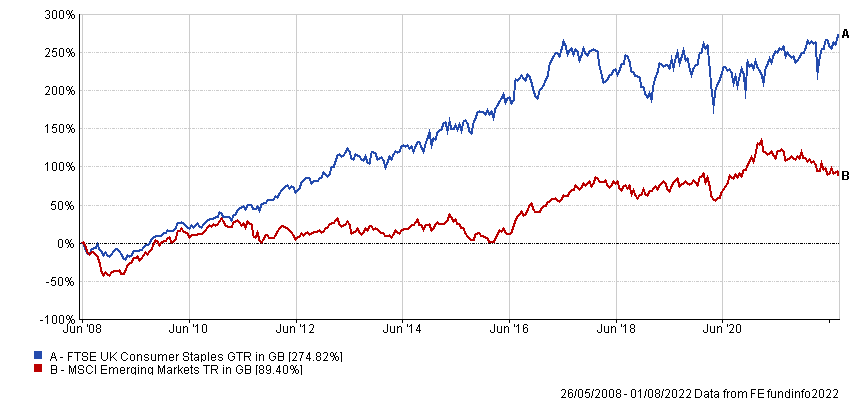Schroders’ value team is buying up stocks heavily exposed to UK consumers even though it expects their spending power to be squeezed in the coming months, saying that “sometimes it pays to run into a burning building”.
The team, which is made up of managers behind funds such as Schroder Recovery and Schroder Income, said that the whole point of raising interest rates is to hit consumer spending power, as it helps bring demand down to a level that more closely matches supply.
“And if people have to lose their jobs to achieve price stability, central bankers believe that is a price worth paying,” the managers added.
As a result, they said it is unlikely the UK consumer will escape unscathed from a hiking cycle that aims to bring inflation of 9% under control from a starting interest rate of close to zero.
However, they pointed out that with the median retail stock on the FTSE falling 38% this year compared with 20% from the rest of the market, much of the hit to spending power may have already been priced in.
“What is happening is not dissimilar to what happens at the start of every economic decline,” the managers added.
“Analysts tend to wait for companies to announce bad news before adjusting forecasts for fear of looking stupid if it doesn’t happen, while the market as a whole tends to react in advance of downgrades.”
In this way, they said the current environment is reminiscent of the financial crisis.
“In the first half of 2008, UK consumer stocks sold off aggressively in anticipation of an economic slowdown, while other areas held up as there was a belief that emerging markets (China in particular) would ‘decouple’ from the West,” the managers continued.
“This time round, UK consumer stocks are selling off aggressively, while commodity focused stocks are holding up due to forecasts of continued elevated demand driven by the forthcoming energy transition.”
Back then, the managers said some investors appeared to mistake the cycle for a new paradigm, which proved to be a mistake – data from FE Analytics shows the FTSE UK Consumer Staples index has made 274.8% since the start of 2008, compared with gains of 89.4% from the MSCI Emerging Markets index.
Performance of indices since 01/07/2022

Source: FE Analytics
The managers said they have no idea if history will repeat itself in terms of energy stocks underperforming from this point in the same way emerging markets did after 2008. Neither do they have any great insight into the future direction of interest rates or the UK economy.
However, they said that to be in with a chance of tapping into the sort of gains made by consumer stocks after 2008, you need to buy in at a depressed price – such as now.
“Sometimes in financial markets, we are compensated for running into a burning building,” they said.
“Today, there are some areas of the market where we believe this to be true. To ensure portfolios are well-positioned at the bottom of whatever ‘this’ is, we need to buy in ahead of the downgrade cycle being complete. It is entirely reasonable to believe downgrades will come.
“Have shares moved to fully price that in? It’s impossible to say. It is also impossible to rotate the portfolio on a single day at the very trough. Our job, as always, is to continually tilt the portfolio towards the areas of opportunity.”
Today, that means moving away from the sectors that have done well for them over the past two years – mining, oil & gas and banking – and towards more domestic-facing cyclical stocks where balance sheets are strong enough to withstand a recession. However, this isn’t as easy as it sounds.
“Each purchase we have made so far has immediately looked naïve,” they added. “The fear of looking naïve ensures few of our competitors will follow suit. This, however, also ensures we will be one of the few to benefit once ‘this’ is over. In the interim, while ‘this’ may be uncomfortable, ‘this’ will allow us to lay the foundations for the performance of the funds over the next five years.”






